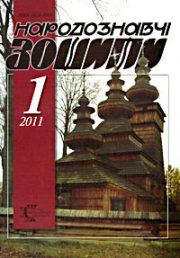The Ethnology Notebooks. 2019, 2 (146), 472—480
UDK 930.2:[37.014.011.3-051(47+57)”19″(093.2)
DOI https://doi.org/10.15407/nz2019.02.472
«DOCUMENTARY SURVEY» THE EVERYDAY LIFE OF SOVIET TEACHERS
HODOVANSKA Oksana
ORCID ID https://orcid.org/0000-0002-8297-2414
Candidate of Historical Sciences, Senior Researcher
Department of Social AnthropologyEthnology Institute of National Academy of Sciences of Ukraine
15, Svobody Avenue, 79000, Lviv, Ukraine
Contacts: e-mail: hodovanska@gmail.com
Abstract. The study of Soviet everyday life is one of the most important directions of contemporary Ukrainian humanities. There is a significant difference in reasoning and personal perception of the disadvantages and advantages of Soviet power. The subject and depth of criticism of this power clearly correlates with the place of residence and ethnicity. Territorial localization of the research testifies the difference in the reasoning and personal perception of the disadvantages and advantages of Soviet power.
At the same time the historical-anthropological approach makes it possible to attract the widest research base. In the article, the everyday life is researched in two dimensions — material and spiritual (mental).
The purpose of the proposed article is to familiarize with official documents of the Soviet authorities in the state regional archives of Ukraine. The main task is to analyze office documents as one of the sources of constructing the everyday life of teachers in Soviet times. For its implementation, step-by-step actions were performed — the information potential of the documents was clarified and the essence of everyday life in the normative documentation was established. It was investigated the official Soviet language «documentary story» about everyday life and discovered the local manifestations of everyday life of teachers. The object of the research is the official documents, and the subject — their content. The basis of the work is the archived documents studied by the author. In the article, the author first published the cited documents.
«Documentary story» is one of the sources of constructing everyday life of teachers. First of all, documents speak the language of numerals, have signs of anti-communicative and militaristic practices, have their own content and are entirely a product of Soviet time. On the basis of archival documents, we assert that the material conditions of teachers occupy a non-dominant place in the structure of the Soviet system of education.
Keywords: everyday life, Soviet time, teachers, normative documents, archives.
Received 16.02.2019
REFERENCES
Yefimenko, H. (2012). Everyday life of teaching. The Ukrainian Soviet Society of the 1930’s. Essays on Everyday Life. Kyiv: Institute of History of Ukraine of the National Academy of Sciences of Ukraine [in Ukrainian].
Kahal’na, M.V. (2015). Everyday life of teachers of the Ukrainian SSR in the second half of the 1950s — the first half of the 1960’s. (Kand. istor. nauk. diss. abstr.). Kyiv [in Ukrainian].
Koliastruk, O. (2010). Intellectuals of the Ukrainian SSR in the 1920s: everyday life. Kharkiv: Rarytety Ukrayiny [in Ukrainian].
Kis, O. Telling the Untold: Representations of Ethnic and Regional Identities in Ukrainian Women’s Autobiographies. (download. doc file). Retrieved from: http://www.womensmemory.net/english/news.asp (Last accessed: 07.02.2019).
Laas, N. (2010). Social history of the post-war Ukraine: the experience of Ukrainian and English-language historiography. Postwar Ukraine: essays on social history (second half of the 1940s — mid-1950’s). (Kn. 1, part 1—2). Kyiv: Institute of History of Ukraine of the National Academy of Sciences of Ukraine [in Ukrainian].
DAIFO. F. R-3. Op. 2. Spr. 111. Ark. 1—7. Orders of the Ministry of Education of the USSR on planning and financing. May 11 — August 23, 1949 [in Ukrainian].
DAIFO. F. R-3. Op. 2. Spr. 263. Ark. 1—110. Correspondence with the Ministry of Education of the USSR on planning and financing. January 5 — December 22, 1952 [in Ukrainian].
DALO. F. R-163. Op. 4. Spr. 51. Ark. 1—157. Report of the Lviv regional department of public education on the work of schools for the academic year 1947—1948 [in Ukrainian].
DALO. F. R-163. Op. 4. Spr. 50. Ark. 1—165. Reports on the implementation of the law on general compulsory education. 1946 year [in Ukrainian].
DALO. F. R-163. Op. 6. Spr. 5. Ark. 1—79. Information about the state of selection, placement and work with pedagogical and managerial personnel of schools of the region for 1960 year [in Ukrainian].
DALO. F. R-3243. Op. 1. Spr. 57. Ark. 1—40. Information on the status of schools in the district in 1961 year [in Ukrainian].
DAIFO. F. R-3. Op. 2. Spr. 1709. Ark. 1—11. Information on the status and work with personnel of the regional education authorities for the 1985—1986 academic year [in Ukrainian and in Russian].
DALO. F. R-163. Op. 4. Spr. 162. Ark. 1—166. Transcript of the regional meeting of the school employees of the Lviv region for 1950 year [in Ukrainian].
Masenko, L. (2017). The language of Soviet totalitarianism. Kyiv: KLIO [in Ukrainian].






